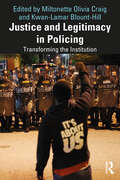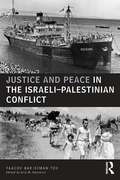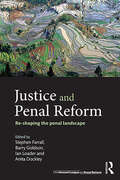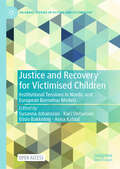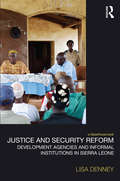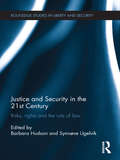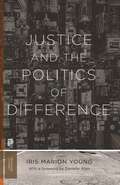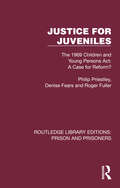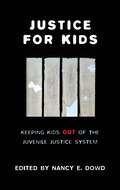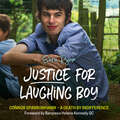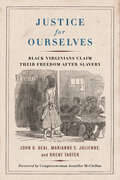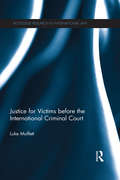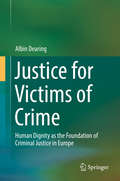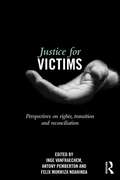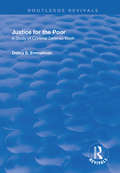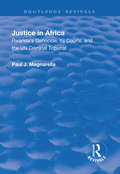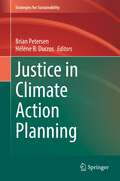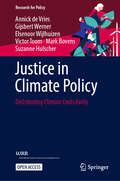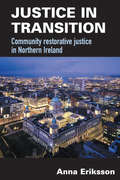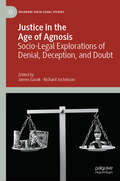- Table View
- List View
Justice and Legitimacy in Policing: Transforming the Institution
by Miltonette Olivia Craig and Kwan-Lamar Blount-HillJustice and Legitimacy in Policing critically analyzes the state of American policing and evaluates proposed solutions to reform/transform the institution, such as implementing body-worn cameras, increasing diversity in police agencies, the problem of crimmigration, limiting qualified immunity, and the abolitionist movement. Considering the changes that have occurred in our socio-political climate, policymakers, scholars, and the public are in need of a book that focuses on the American policing institution in a comprehensive yet critical manner. Each chapter is devoted to a specific area of policing that has either received criticism for the problems it may create or has been proposed to effect reform. The chapters are sequenced such that readers are introduced to a spectrum of topics to expand the discourse on changes needed to achieve equitable policing. The book also encourages readers to consider the idea that achieving justice and legitimacy in policing cannot happen as the institution is now formulated, and it invites readers to use the topics discussed in each chapter to envision transformative propositions. Justice and Legitimacy in Policing is intended to engage policymakers and practitioners as well as interested members of the public. The scope of this book also makes it a valuable resource for academics and students.
Justice and Peace in the Israeli-Palestinian Conflict (UCLA Center for Middle East Development (CMED) series)
by Yaacov Bar Siman TovIn this book, the late Prof. Yaacov Bar-Siman-Tov argues that the failure of the Israeli-Palestinian peace process so far has been mainly the result of the inability of both sides to reach an agreed formula for linking justice to peace. The issues of justice and injustice are focused mainly on the outcomes of the 1947-1949 first Arab-Israeli War and specifically in the creation of the Palestinian refugee problem. The conflicting historical narratives of the two sides regarding the question of responsibility for the injustice done to the Palestinians turn the Israeli-Palestinian conflict into a classic case of linking the issues of justice and peace.Yaacov Bar-Siman-Tov maintains that the narratives of justice and injustice in the Israeli-Palestinian conflict have proved to be formidable barriers to peace. Hence, he recommends that justice should be compromised for the sake of peace. The link between justice and peace is an important issue requiring both sides’ attention, but, given the wide and currently unbridgeable gap separating the two sides, it should be postponed to the phase of reconciliation rather than being included in the process of conflict resolution. The two-state solution is endorsed as the best and practical solution and as a first step for a "just peace" in this conflict, to be followed by reconciliation. Highly topical, this book is essential reading for scholars and researchers of International Relations, Peace Studies and the Arab-Israeli conflict.
Justice and Penal Reform: Re-shaping the Penal Landscape
by Barry Goldson Ian Loader Stephen Farrall Anita DockleyIn the aftermath of the financial crisis of 2008, Western societies entered a climate of austerity which has limited the penal expansion experienced in the US, UK and elsewhere over recent decades. These altered conditions have led to introspection and new thinking on punishment even among those on the political right who were previously champions of the punitive turn. This volume brings together a group of international leading scholars with a shared interest in using this opportunity to encourage new avenues of reform in the penal sphere. Justice is a famously contested concept and this book takes a deliberately capacious approach to the question of how justice can be mobilised to inform new reform agendas. Some of the contributors revisit an antique question in penal theory and reconsider the question of what fair or just punishment should look like today. Others seek to make gender central to understanding of crime and punishment, or actively reflect on the part that related concepts such as human rights, legitimacy and trust can and should play in thinking about the creation of more just crime control arrangements. Faced with the expansive penal developments of recent decades, much research and commentary about crime control has been gloom-laden and dystopian. By contrast, this volume seeks to contribute to a more constructive sensibility in the social analysis of penality: one that is worldly, hopeful and actively engaged in thinking about how to create more just penal arrangements. Justice and Penal Reform is a key resource for academics and as a supplementary text for students undertaking courses on punishment, penology, prisons, criminal justice and public policy. This book approaches penal reform from an international perspective and offers a fresh and diverse approach within an established field.
Justice and Recovery for Victimised Children: Institutional Tensions in Nordic and European Barnahus Models (Palgrave Studies in Victims and Victimology)
by Susanna Johansson Kari Stefansen Elisiv Bakketeig Anna KaldalThis open access book contributes to ongoing discussions about how societies should respond to children who have experienced violence and abuse by delving into the Barnahus model: a multidisciplinary and co-located model whose aim is to provide both justice and recovery to victimised children. The promising model was first implemented in the Nordic region and is currently being diffused across Europe, although scientific knowledge about the model remains scarce: the Barnahus model’s potential for delivering holistic services, the various tensions and dilemmas involved in the model, and how dual mandate of Barnahus can be managed all require further research. Continuing from the volume Collaborating Against Child Abuse (2017) which examined the process of Barnahus’ diffusion in the Nordic countries, the current book digs deeper into the intrinsic institutional tensions of the model, as well as those that might arise during collaboration, in order to advance our understanding of what can be achieved through the model and thus improve the situation of child victims of violence and abuse. An institutional perspective is used in the book which is structured in four parts. The first three parts explore different types of institutional tensions –legal, organisational, and professional-ethical, while the fourth focuses on how these tensions may be balanced. The book’s authors chart this new phase in the diffusion and translation of the Barnahus model. Their analyses will provide valuable guidance to countries that are currently considering or are already implementing the model.
Justice and Security Reform: Development Agencies and Informal Institutions in Sierra Leone (Law, Development and Globalization)
by Lisa DenneyJustice and Security Reform: Development Agencies and Informal Institutions in Sierra Leone undertakes a deep contextual analysis of the reform of the country’s security and justice sectors since the end of the civil war in 2002. Arguing that the political and bureaucratic nature of development agencies leads to a lack of engagement with informal institutions, this book examines the challenges of sustainably transforming security and justice in fragile states. Through the analysis of a post-conflict context often held up as an example of successful peacebuilding, Lisa Denney reveals how the politics of development agencies is an often forgotten constraint in security and justice reform and development efforts more broadly. Particularly suited to upper-level undergraduates and postgraduate students, as well as practitioners, this book is relevant to those interested in security and justice reform and statebuilding, as well Sierra Leone’s post-conflict recovery.
Justice and Security in the 21st Century: Risks, Rights and the Rule of Law (Routledge Studies in Liberty and Security)
by Barbara Hudson Synnøve UgelvikThis book examines the question of whether justice or security is the primary virtue of 21st-century society. The issue of enhancing security without undermining justice – managing risk without undermining the rule of law – has always been problematic. However, recent developments such as new counter-terrorism measures, the expanding scope of criminal law, harsher migration control and an increasingly pronounced concern with public safety, have posed new challenges. The key element of these contemporary challenges is that of membership and exclusion: that is, who is to be included within the community of justice, and against whom is the just community aiming to defend itself? Justice and Security in the 21st Century brings together researchers from various academic disciplines and different countries in order to explore these developments. It attempts to chart the complex landscapes of justice, human rights and the rule of law in an era when such ideals are challenged by increasing demands for efficiency, effectiveness, public safety and security. This edited volume will be of much interest to students of critical legal studies, criminology, critical security studies, human rights, sociology and IR in general.
Justice and the Politics of Difference (Princeton Classics Ser. #122)
by Iris Marion YoungIn this classic work of feminist political thought, Iris Marion Young challenges the prevailing reduction of social justice to distributive justice. It critically analyzes basic concepts underlying most theories of justice, including impartiality, formal equality, and the unitary moral subjectivity. The starting point for her critique is the experience and concerns of the new social movements about decision making, cultural expression, and division of labor--that were created by marginal and excluded groups, including women, African Americans, and American Indians, as well as gays and lesbians. Iris Young defines concepts of domination and oppression to cover issues eluding the distributive model. Democratic theorists, according to Young do not adequately address the problem of an inclusive participatory framework. By assuming a homogeneous public, they fail to consider institutional arrangements for including people not culturally identified with white European male norms of reason and respectability. Young urges that normative theory and public policy should undermine group-based oppression by affirming rather than suppressing social group difference. Basing her vision of the good society on the differentiated, culturally plural network of contemporary urban life, she argues for a principle of group representation in democratic publics and for group-differentiated policies. Danielle Allen's new foreword contextualizes Young's work and explains how debates surrounding social justice have changed since--and been transformed by--the original publication of Justice and the Politics of Difference.
Justice at Work: The Rise of Economic and Racial Justice Coalitions in Cities
by Marc Doussard Greg SchrockA pathbreaking look at how progressive policy change for economic justice has swept U.S. cities In the 2010s cities and counties across the United States witnessed long-overdue change as they engaged more than ever before with questions of social, economic, and racial justice. After decades of urban economic restructuring that intensified class divides and institutional and systemic racism, dozens of local governments countered the conventional wisdom that cities couldn&’t address inequality—enacting progressive labor market policies, from $15 minimum wages to paid sick leave.Justice at Work examines the mutually reinforcing roles of economic and racial justice organizing and policy entrepreneurship in building power and support for policy changes. Bridging urban social movement and urban politics studies, it demonstrates how economic and racial justice coalitions are collectively the critical institution underpinning progressive change. It also shows that urban policy change is driven by &“urban policy entrepreneurs&” who use public space and the intangible resources of the city to open &“agenda windows&” for progressive policy proposals incubated through national networks. Through case studies of organizing and policy change efforts in cities including Chicago, Seattle, and New Orleans around minimum wages, targeted hiring, paid time off, fair scheduling, and anti-austerity, Marc Doussard and Greg Schrock show that the contemporary wave of successful progressive organizing efforts is likely to endure. Yet they caution that success is dependent on skillful organizing that builds and sustains power at the grassroots—and skillful policy work inside City Hall. By promoting justice at—and increasingly beyond—work, these movements hold the potential to unlock a new model for inclusive economic development in cities.
Justice at a Distance
by Loren E. LomaskyThe current global-justice literature starts from the premise that world poverty is the result of structural injustice mostly attributable to past and present actions of governments and citizens of rich countries. As a result, that literature recommends vast coercive transfers of wealth from rich to poor societies, alongside stronger national and international governance. Justice at a Distance, in contrast, argues that global injustice is largely home-grown and that these native restrictions to freedom lie at the root of poverty and stagnation. The book is the first philosophical work to emphasize free markets in goods, services, and labor as an ethical imperative that allows people to pursue their projects and as the one institutional arrangement capable of alleviating poverty. Supported by a robust economic literature, Justice at a Distance applies the principle of noninterference to the issues of wealth and poverty, immigration, trade, the status of nation-states, war, and aid.
Justice for Juveniles: The 1969 Children and Young Persons Act: A Case for Reform? (Routledge Library Editions: Prison and Prisoners)
by Philip Priestley Roger Fuller Denise FearsThe working of the 1969 Children and Young Persons Act was the subject of much debate in the 1970s. Discussion had been strong on opinion and short on facts; this book, originally published in 1977, supplied some much-needed evidence, based on the results of a research project funded by the Home Office Research Unit. It also discusses the origins of the Act and its consequences for children and their families. The authors describe the way in which two groups of children were dealt with by the police, social workers, probation officers and juvenile courts during the first three months of 1972. Their findings depict a system which decides what to do with ‘children in trouble’ mainly on the basis of their offence behaviour rather than on assessments of their personal needs – a ‘judicial’ rather than ‘welfare’ system of the kind envisaged in the legislation. As a result of these observations, the authors conclude that ‘the idea of the juvenile court has been tried and found wanting, and that it suffers from the congenital defects which fresh applications of money or manpower will fail to cure.’ They recommend the abolition of the juvenile court and the raising of the age of criminal responsibility, proposing a number of controversial alternatives based on principles of non-intervention.
Justice for Kids: Keeping Kids Out of the Juvenile Justice System (Families, Law, and Society #2)
by Nancy E. DowdChildren and youth become involved with the juvenile justice system at a significant rate. While some children move just as quickly out of the system and go on to live productive lives as adults, other children become enmeshed in the system, developing deeper problems and or transferring into the adult criminal justice system. Justice for Kids is a volume of work by leading academics and activists that focuses on ways to intervene at the earliest possible point to rehabilitate and redirect—to keep kids out of the system—rather than to punish and drive kids deeper. Justice for Kids presents a compelling argument for rethinking and restructuring the juvenile justice system as we know it. This unique collection explores the system’s fault lines with respect to all children, and focuses in particular on issues of race, gender, and sexual orientation that skew the system. Most importantly, it provides specific program initiatives that offer alternatives to our thinking about prevention and deterrence, with an ultimate focus on keeping kids out of the system altogether.
Justice for Laughing Boy: Connor Sparrowhawk - A Death by Indifference
by Sara RyanOn July 4th 2013, Connor Sparrowhawk, also known as Laughing Boy or LB, was found dead in a specialist NHS unit. Connor, who had autism and epilepsy, had a seizure while in the bath and no member of staff was on hand to stop him from drowning. An entirely preventable death. Connor's mother Sara Ryan tells the touching story of her remarkable son's early life, then premature death. She articulates the harrowing experience of not only losing a child, but then having to fight to discover the truth about the circumstances of his death. Following Connor's death, Sara and others start the dynamic #JusticeforLB campaign to highlight the injustice of Connor's death. It quickly gains momentum and becomes a rallying cry not only for Connor, but for the many other injustices learning disabled adults experience, leading to high-profile inquiries which uncover shocking rates of premature death among this group. Justice for Laughing Boy tells a very uncomfortable truth about the experiences of people with learning disabilities in inpatient settings today. It serves as a wake-up call to all of us and asks: can we really claim that we respect the life and dignity of learning disabled people?
Justice for Laughing Boy: Connor Sparrowhawk - A Death by Indifference
by Sara RyanA mother's memoir which tells the story of her son's premature death while in NHS care, and her subsequent campaign for justice and for the rights of people with learning disabilities.On July 4th 2013, Connor Sparrowhawk, also known as Laughing Boy or LB, was found dead in a specialist NHS unit. Connor, who had autism and epilepsy, had a seizure while in the bath and no member of staff was on hand to stop him from drowning. An entirely preventable death.Sara Ryan presents a frank, sometimes funny and touching account of her son's early life and preventable death and the unfolding #JusticeforLB campaign. This serves as a wake-up call to all of us and asks: can we really claim that we respect the life and dignity of learning disabled people?(P) 2021 Jessica Kingsley Publishers
Justice for Ourselves: Black Virginians Claim Their Freedom after Slavery (The American South Series)
by Brent Tarter John G. Deal Marianne E. JulienneA new look at the Black Virginians who defined and realized their freedom after the collapse of slavery &“Verily, the work does not end with the abolition of slavery,&” wrote Frederick Douglass in 1862, &“but only begins.&” The Emancipation Proclamation and the Thirteenth Amendment altered a legal status; to make freedom a reality represented a different challenge altogether.Justice for Ourselves tells the stories of remarkable Black men and women in post–Civil War Virginia who persevered in the face of overwhelming barriers to seek their freedom and create a new world for themselves and future generations. Drawing on the life stories of individuals from all regions of the state—political leaders, teachers, ministers, journalists, and entrepreneurs—Justice for Ourselves recounts their quests to attain full American citizenship and economic independence before the onset of Jim Crow repression. Centering Black voices, this book includes tales of opportunities seized and opportunities lost and will reshape the narrative of Black history and the history of Virginia in the second half of the nineteenth century.
Justice for Victims before the International Criminal Court (Routledge Research in International Law)
by Luke MoffettMany prosecutors and commentators have praised the victim provisions at the International Criminal Court (ICC) as 'justice for victims', which for the first time include participation, protection and reparations. This book critically examines the role of victims in international criminal justice, drawing from human rights, victimology, and best practices in transitional justice. Drawing on field research in Northern Uganda, Luke Moffet explores the nature of international crimes and assesses the role of victims in the proceedings of the ICC, paying particular attention to their recognition, participation, reparations and protection. The book argues that because of the criminal nature and structural limitations of the ICC, justice for victims is symbolic, requiring State Parties to complement the work of the Court to address victims' needs. In advancing an innovative theory of justice for victims, and in offering solutions to current challenges, the book will be of great interest and use to academics, practitioners and students engaged in victimology, the ICC, transitional justice, or reparations.
Justice for Victims of Crime
by Albin DearingThis book analyses the rights of crime victims within a human rights paradigm, and describes the inconsistencies resulting from attempts to introduce the procedural rights of victims within a criminal justice system that views crime as a matter between the state and the offender, and not as one involving the victim. To remedy this problem, the book calls for abandoning the concept of crime as an infringement of a state's criminal laws and instead reinterpreting it as a violation of human rights. The state's right to punish the offender would then be replaced by the rights of victims to see those responsible for violating their human rights convicted and punished and by the rights of offenders to be treated as accountable agents.
Justice for Victims: Perspectives on rights, transition and reconciliation
by Stephan Parmentier Rianne Letschert Antony Pemberton Felix Mukwiza Ndahinda Ivo Aertsen Inge Vanfraechem Victor Jammers Sonja LeferinkJustice for Victims brings together the world’s leading scholars in the fields of study surrounding victimization in a pioneering international collection. This book focuses on the current study of victims of crime, combining both legal and social-scientific perspectives, articulating both in new directions and questioning whether victims really do have more rights in our modern world. This book offers an interdisciplinary approach, covering large-scale (political) victimization, terrorist victimization, sexual victimization and routine victimization. Split into three sections, this book provides in-depth coverage of: victims' rights, transitional justice and victims' perspectives, and trauma, resilience and justice. Victims' rights are conceptualised in the human rights framework and discussed in relation to supranational, international and regional policies. The transitional justice section covers victims of war from those caught between peace and justice, as well as post-conflict justice. The final section focuses on post-traumatic stress, connecting psychological and anthropological perceptions in analysing collective violence, mass victimization and trauma. This book addresses challenging and new issues in the field of victimology and the study of transitional and restorative justice. As such, it will be of interest to researchers, practitioners and students interested in the fields of victimology, transitional justice, restorative justice and trauma work.
Justice for the Poor: A Study of Criminal Defence Work
by Debra S. EmmelmanThis title was first published in 2003. In this study, the author examines the behavior of one group of court-appointed defence attorneys and reaches the conclusion that although, in contrast to popular opinion, these attorneys maintain an adversarial stance against the prosecutors and behave in a legally ethical (or "procedurally just") manner, case outcomes are unduly shaped by social class and are therefore substantively unjust. This occurs because poor defendants typically lack cultural rhetoric that favourably influences those who construct and operate the criminal court system. Ironically, this indicates that, in many cases, the process of plea bargaining may be more substantively just than trials. A major contribution of the study is the detailed analysis of the manner by which oppression and substantive injustice occur in the adjudication of many cases and how the cultural practices of the powerful can frequently misconstrue, exclude and mute the voices of the poor.
Justice in Africa: Rwanda's Genocide, Its Courts and the UN Criminal Tribunal (Routledge Revivals)
by Paul J MagnarellaThis title was first published in 2000: This work describes the United Nations International Criminal Tribunal for Rwanda (ICTR) - the first international court created to try persons for genocide and violation the humanitarian law of non-international armed conflict. The book begins with an explanation of the causes of the 1994 genocide in Rwanda. It then discusses the UN Security Council's creation of the ICTR and the Tribunal's organization, functioning, accomplishments and shortcomings. The author explains how the Tribunal has gained custody over suspects who had fled to other countries in Africa, Europe and also to the USA. The book analyzes the ICTR's first several cases and describes the unique contributions the Tribunal is making to the expansion of humanitarian law. In addition, the author describes Rwanda's own legal attempts to deal with the trauma of 1994 by passing a new genocide statute and creating special genocide courts. He also explains the similiarities and differences between the Tribunal for Rwanda and the one created by the UN Security Council to deal with major crimes committed during the break-up of former Yugoslavia.
Justice in America: The Separate Realities of Blacks and Whites
by Mark Peffley Jon HurwitzAs reactions to the O. J. Simpson verdict, the Rodney King beating, and the Amadou Diallo killing make clear, whites and African Americans in the United States inhabit two different perceptual worlds, with the former seeing the justice system as largely fair and color blind and the latter believing it to be replete with bias and discrimination. The authors tackle two important questions in this book: what explains the widely differing perceptions, and why do such differences matter? They attribute much of the racial chasm to the relatively common personal confrontations that many blacks have with law enforcement - confrontations seldom experienced by whites. More importantly, the authors demonstrate that this racial chasm is consequential: it leads African Americans to react much more cynically to incidents of police brutality and racial profiling, and also to be far more skeptical of punitive anti-crime policies ranging from the death penalty to three-strikes laws.
Justice in Climate Action Planning (Strategies for Sustainability)
by Brian Petersen Hélène B. DucrosThis edited volume examines how climate action plans engage justice at the scale of the city. Recent events in the United States make the context particularly ripe for a discussion of justice in urban climate politics. On the one hand, the emergence of the Black Lives Matter movement, George Floyd’s death, and the prominence of racial discrimination in the public realm have mainstreamed the notion of justice. On the other hand, the dire consequences of increased frequency and severity of climate events on vulnerable segments of urban populations are undeniable. While some cities have been proactive about integrating justice in their climate action planning, in most places an explicit and systematic link between both spheres has been lacking. This book explores this interface as it seeks to understand how cities can respond to climate change in a just way and for just outcomes. While resilience strategies based on “development” may engage historic inequities, they may at the same time result in marginalizing certain populations through various processes, from mismatched solutions to outright exclusion and climate gentrification. By identifying how certain populations are included in or excluded from climate action planning practices, the chapters in this volume draw on case studies to outline the differential outcomes of climate action in American cities, also proposing a template for comparative work beyond the US. The authors tackle the debate about how justice is or is not integrated in climate action plans and assess practical implications, while also making theoretical and methodological contributions. As it fills a gap in the literature at the intersection of justice and climate action, the book produces new insights for a wide-ranging audience: students, practitioners, policy-makers, planners, the non-profit sector, and scholars in geography, urban planning, urban studies, environmental studies, ecology, political science, or anthropology. Along five axes of investigation―theory, resilience, equity, community, and comparison as method―the contributors offer various pathways into the intersection between urban climate action and different understandings of justice. Collectively, they invite a reflection that can lead to practical initiatives in climate mitigation, while also advancing the theorization of social justice to account for the urban as a node where (in)justice plays out and can be addressed with significant results.
Justice in Climate Policy: Distributing Climate Costs Fairly (Research for Policy)
by Mark Bovens Victor Toom Annick de Vries Gijsbert Werner Elsenoor Wijlhuizen Suzanne HulscherThis open access book is looking into ways to achieve just climate policy within a country. The authors of this monograph share a unique, timely and original vision: continuous support for climate policy is more likely to emerge when citizens find that the distribution of the bill for climate costs is fair. But what is a fair distribution of climate costs? This is an important question because financial costs of mitigation (reducing greenhouse gases), adaptation (adapting to climate change) and damage (compensating or compensating after weather extremes) increase significantly in the coming decades. Drawing on philosophy and ethics, the authors propose ten principles for achieving just distributions of domestic climate costs. Examples of such principles are individual responsibility, the polluter pays, greatest utility and capacity to pay. Yet what a fair distribution is, depends on, for example, political preferences and the policy issue at hand. Empirical research on designing climate policies, however, shows that distributive principles are not part of the political, policy, and public discussions. The authors therefore argue that explicit attention to principles of just distribution at the start of a policy process contributes to support for climate policy. This book provides tools to professionals and students to achieve justice in climate policy.
Justice in Health
by Camille BurnettInequities and health disparities are the greatest and most pressing social issues of our time. This book explores public health practice through the critical lens of social and structural justice by examining our approach to health and what it means to be healthy, systemically and structurally.Through recent events, the raw reality of health disparities and inequities have been exposed. These events are earmarked by COVID-19's decimating and disparate impacts on Black and Brown populations during one of the greatest social movements of our time to end racism. Since this very public explosion of intersecting forms of oppression and inequitable suffrage, many have clamored to make sense of it, to reframe our narratives toward action, and re-envision what progress and change could look like. This text is positioned as a tool to help professionals dismantle old ways of thinking while reconstructing new ones that can be more responsive in meeting the realities of today.The author challenges the reader to think about public health more deeply and pragmatically as the space for reconciling solutions to these poignant health issues. This requires the exploration of an ideological shift in how we think of health, how we prepare healthcare providers outside of an antiquated sick care system, and how we prioritize the determinants of health across a re-imagined continuum of care. The scope of this book ranges from a historical and structural examination of our beliefs about health to perceiving a more just system of care where health is intentionally co-created toward this aim. It intentionally explores health along the lines of equity and through the broader lens of the social determinants of health to shed light on the opportunity in this moment that public health creates for health care.Justice in Health is a timely and important resource for healthcare professionals (pre- and post-licensure) and healthcare decision-makers. The book also appeals more widely to instructors, academics, researchers, and students across disciplines of nursing, medicine, public heath, sociology, and social work.
Justice in Transition
by Anna ErikssonThis book provides a unique account of the high-profile community-based restorative justice projects in the Republican and Loyalist communities that have emerged with the ending of the conflict in Northern Ireland. Unprecedented new partnerships between Republican communities and the Police Service of Northern Ireland have developed, and former IRA and UVF combatants and political ex prisoners have been amongst those involved. Community restorative justice projects have been central to these groundbreaking changes, acting as both facilitator and transformer. Based on an extensive range of interviews with key players in this process, many of them former combatants, and unique access to the different community projects this books tells a fascinating story. At the same time this book explores the wider implications for restorative justice internationally, highlighting the important lessons for partnerships between police and community in other jurisdictions, particularly in the high-crime alienated neighbourhoods which exist in most western societies, as well as transitional ones. It also offers a critical analysis of the roles of both community and state and the tensions around the ownership of justice, and a critical, unromanticized assessment of the role of restorative justice in the community.
Justice in the Age of Agnosis: Socio-Legal Explorations of Denial, Deception, and Doubt (Palgrave Socio-Legal Studies)
by Richard Jochelson James GacekThis book seeks to further the understanding of the human experience of coerced and forced ignorance on social, human rights and criminal justice related topics, drawing together scholars from multiple, disciplinary fronts. It argues that people in our social world are forced or coerced through either implicatory or interpretive denial that is normalized through specific cultural and social mechanisms by which we refer to this as non-knowledge or agnosis. There has also been a lack of scholarship which examines how human victimization and power intersects by and through the systematic orchestration of forced ignorance and doubt upon daily human life. This book's focus is an examination of the ways in which people find themselves in social spaces without empirical clarity and understand that absence as satisfaction, stability, or perhaps even pleasure. It discusses a range of topics, including for example people's sense of relative safety, despite empirical realities suggesting otherwise. This book seeks to make visible the role of ignorance in governing society, highlighting how the late modern human experience in a post-World War II human rights era subsumes, subverts, and sublimates the complex relationship between knowledge and denial; the empirical gulf between knowledge and resistance may indeed breed complicit bliss.
